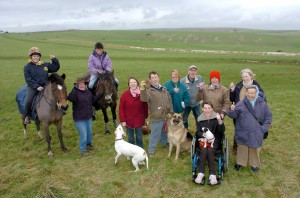Support us from £3/month
We deal with almost 1000 cases a year assisting communities, groups and individuals in protecting their local spaces and paths in all parts of England and Wales. Can you help us by joining as a member?
A public-inquiry inspector has rejected Telscombe Town Council’s application for fencing of parts of Telscombe Tye Common, north of Peacehaven in East Sussex.
The inquiry was held in June this year into the council’s application, under section 38 of the Commons Act 2006, for works on common land. The objectors included the British Horse Society. We made a written representation.
The council wished to erect about 1.6 miles of fencing around part of the common in order to graze it, to improve the biodiversity of the chalk downland site. We considered that the fence would be an eyesore in the beautiful landscape of the South Downs National Park and would obstruct public access to the area: people have the right to walk and ride over the whole common.
The fencing would also interfere with well-used tracks across the common. There was no explanation of how the works would benefit the common and those with an interest in it.
The inspector, Sue Arnott, accepted ‘that an effective and robust management regime needs to be implemented to tackle the encroachment of the vegetation’ and that ‘such a scheme will have two main objectives: to restore the traditional species-rich vegetation characteristic of chalk downland and to improve opportunities for the public, including people with disabilities, to access and enjoy the common on foot and horseback’. However, she acknowledged the difficulty that the applicants had not given a full explanation of the management activities they proposed and the effect they would have—on the archaeological features and on public access for instance. ‘The granting of consent for works on common land must be based on facts, not promises’, she said.
Says Jackie Rowland, a local member of the Open Spaces Society who appeared at the inquiry: ‘We believe this scheme was not properly prepared and thought through. Telscombe Town Council should have followed the process the Open Spaces Society and others advocate in the multi-agency document A Common Purpose. It should have consulted widely, demonstrated the rationale for what it proposed and obtained understanding and agreement from all interested parties before proceeding to a costly public inquiry. We accept that the area could benefit from grazing, but the details of how this can be achieved need much more careful consideration.
‘This case shows the complexity of managing common land and the need to try to get all the interests on board before charging ahead with incomplete and contentious proposals. Commons are immensely special for their public interest, and they are also very fragile. We should cherish them for their unique qualities,’ Jackie concludes.
Read the decision letter here.

